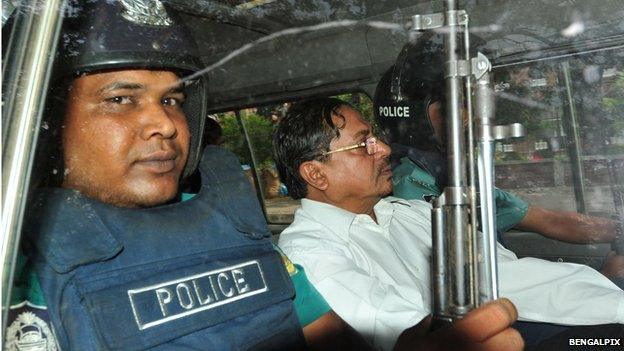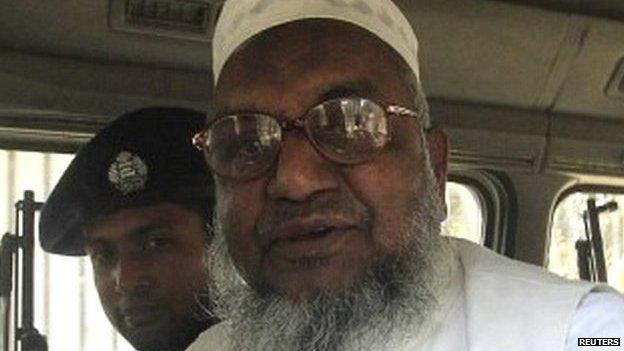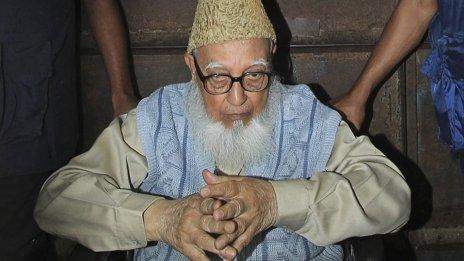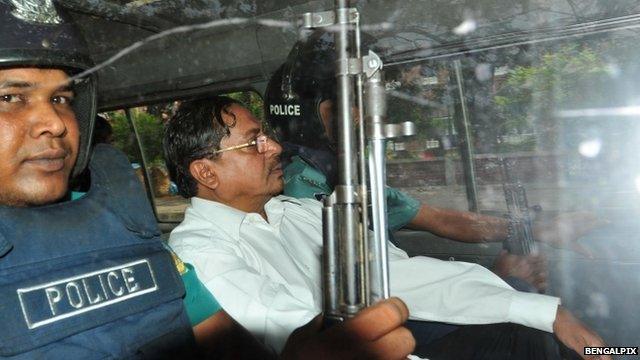Bangladesh: Islamist leader Kamaruzzaman's appeal rejected
- Published

Kamaruzzaman (C) can seek clemency from the Bangladeshi President Abdul Hamid (file photo)
Bangladesh's Supreme Court has rejected a final appeal against a death sentence given to a senior Islamist leader.
Mohammad Kamaruzzaman of the Jamaat-e-Islami party was found guilty of genocide by a domestic war crimes tribunal in May 2013.
A review petition was dismissed on Monday. The attorney general said there was now no reason why he could not be executed.
Kamaruzzaman's lawyers could decide to seek mercy from the president.
The 62-year-old was convicted of crimes committed during the country's war of independence from Pakistan in 1971, including a mass killing of at least 120 unarmed farmers in the northern border town of Sohagpur.
Three women widowed as a result of the killings testified against Kamaruzzaman during his trial. They described how he led Pakistani troops to the village and helped the soldiers to line up and execute the farmers.
An appeal court in November last year upheld the verdict and a sentence of death by hanging.
But Kamaruzzaman's lawyers made a last-ditch legal appeal, arguing that there were "serious discrepancies" in the testimonies of prosecution witnesses at his trial.
That has now been rejected by the Chief Justice of Bangladesh, S K Sinha.
'Notorious criminal'
Political activists who had gathered in court welcomed the ruling.
"We're happy. He is a notorious war criminal. We made several attempts during the 1971 war to capture him. But finally he is caught by the court," Anwar Hossain, who fought in the independence war, told AFP news agency.

Jamaat-e-Islami senior leader Abdul Quader Mollah was executed just hours after his review petition was rejected in 2013
"We hope he'll be executed (in) the quickest time possible," he added.
Estimates for the number of people killed in the nine-month Bangladeshi war vary, with the government suggesting as many as three million died.
Others say that figure is too high and unverifiable.
Prime Minister Sheikh Hasina set up the war crimes tribunal in 2010 to look into abuses during the period.
The first person executed was Jamaat-e-Islami senior leader Abdul Quader Mollah in December 2013.
Opposition parties say the war crimes trials are politically motivated and aimed at settling scores.
Attorney General Mahbubey Alam said prison authorities would now ask Kamaruzzaman whether he would seek clemency from President Abdul Hamid.
"If he refuses, he could be hanged any moment," he added.

Bangladesh independence war, 1971
Civil war erupts in Pakistan, pitting the West Pakistan army against East Pakistanis demanding autonomy and later independence
Fighting forces an estimated 10 million East Pakistani civilians to flee to India
In December, India invades East Pakistan in support of the East Pakistani people
Pakistani army surrenders at Dhaka and its army of more than 90,000 become Indian prisoners of war
East Pakistan becomes the independent country of Bangladesh on 16 December 1971
Exact number of people killed is unclear - Bangladesh says it is three million but independent researchers say there were up to 500,000 fatalities
- Published4 September 2016

- Published9 May 2013
